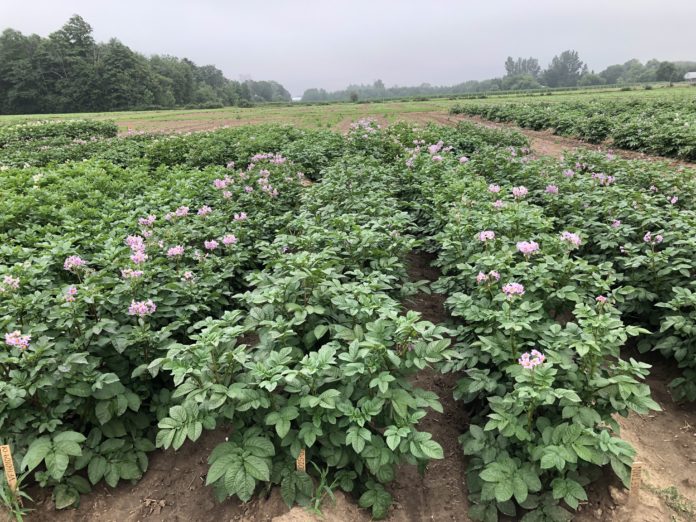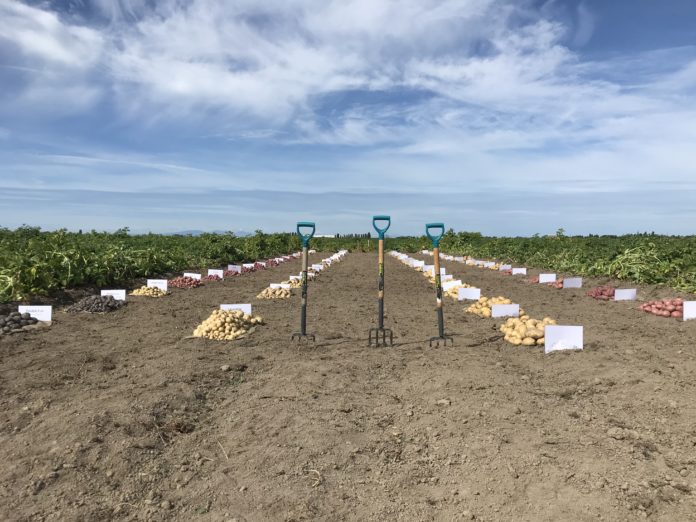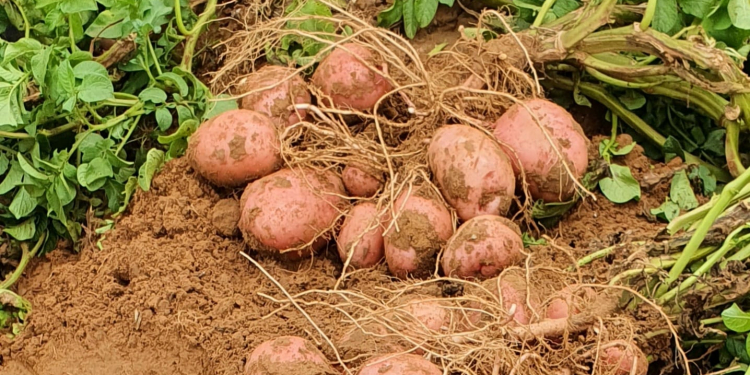The Canadian Potato Council runs a program with groups across the country to test potato varieties locally.
Potato growers in Canada are always interested in and wanting to try out new varieties of potatoes. However, before they plant a full field of a potatoes, they need reassurance of how these potatoes will do in their area, which is where the Canadian Potato Council’s (CPC) regional variety program comes into the picture.
“The variety of evaluation work here is really focusing on evaluating the material that’s of most interest to Peak growers and for the market sector that we’re in. So, Ag Canada is a part of that. But we’re also very interested in working with other breeders that are developing material. So, it’s very much grower driven in terms of what they want to see,” Tracy Shinners-Carnelley, vice president of research and quality at Peak of the Market, says during an interview at the Manitoba trial site near Winkler, Man.

The varietal program partners with regional groups across the country in Prince Edward Island, Quebec, Ontario, Manitoba, Alberta, and British Columbia. There are also variety trials in Saskatchewan and New Brunswick, but those are run by Agriculture and Agri-Food Canada (AAFC). The CPC part of program is part of the Canadian Horticultural Council cluster projects funded by the Canadian Agricultural Partnership (CAP).
“Our trial includes varieties recently or close to commercialization so that if someone sees something in our trials, and they say, ‘Oh, wow, that looks like a really interesting variety that might really fit my production.’ They can usually get seed of it. When people are looking at the breeding line trials, they’re usually several years away from commercialization,” Mary Kay Sonier, the seed coordinator at the P.E.I. Potato Board, explains in a phone interview.
The CPC’s research website says the program is designed to allow for the local evaluation of adaptability of promising new varieties or selections across Canada. Varieties from AAFC’s National Potato Breeding Program and selections from private breeding programs, university breeding programs in the United States and Canada, are included.
The AAFC varieties grown are from the program’s year five trials or later. In years one through four, varieties are grown across the country to duplicate clones and test their adaptability to different climatic regions. The CPC says promising selections are then offered for further field evaluation in the local regional trials.
The Potato Trials
The variety program cycle starts in the off-season when those running the local programs start networking with breeders and companies to see what new varieties are available for plot testing. They also check in with growers to see if there are any varieties they’re interested in seeing data on or any disease or pest properties they would like to see varieties with resistance to.
Once they have the list of what varieties they’re testing for the growing season and collect seed for them, the potatoes are then planted in the spring. They are planted next to industry standard varieties such as Yukon Gold or other regional varieties for comparison purposes. Throughout the growing season the plots are monitored and if irrigation is available, they are watered.
Towards the end of the summer, most sites will host a field day where growers are invited to come to the test plots and see the varieties on display. These field days haven’t always been able to happen in recent years due to the pandemic.
The plots are then harvested and that’s when the real fun begins. Data is recorded on the potatoes such as yield, size profiles, gravity, how they hold up in storage, and if they have any visual defects. The data is then shared in reports with growers.
“Then we start to discuss and learn, like what people like in the data when they’re looking for new variety, and what are they focused on. Everyone will have something different that they’re looking for, and sometimes different varieties have a better fit for different farms,” Shinners-Carnelley explains.
The discussion with farmers helps play into picking varieties for the next trial season, starting the cycle over again.
CHECK OUT — Chart detailing the provincial variety evaluation trials for 2020
In P.E.I. their trials are done by AAFC at the research station at Harrington on non-irrigated fields. Sonier assists in the trials by helping to arrange new fresh and chipping potato varieties from private agents and breeders for the trials.
In Quebec, trials are grown at two sites at Sainte-Croix and L’Assomption. There are five sub trial groups grown according to potato type including white round, yellow flesh, long, red skinned, and specialty.

Ontario’s trials are planted at the Elora Research Station and Leamington, with Vanessa Currie, a research technician at the University of Guelph, acting as the point person to collect all the data on the trials. The trials are planted in non-irrigated fields; however, irrigation systems can be set up if wanted. Chipping and fresh market varieties are grown, some french fry potato lines are also tested but for use in the fresh market.
In Manitoba, Shinners-Carnelley oversees running the trials at Peak of the Market’s irrigated field site near Winkler, Man. The trials focus on fresh market varieties.
In Alberta the program is run by Chandra Singh at the Crop Diversification Centre South in Brooks, Alta. They’re planted on irrigated plots with processing and fresh varieties being tested.
B.C.’s potato trials are run by Heather MeBerg, the owner of E.S. Cropconsult Ltd. They are planted at different locations each year, with the 2021 trials being planted on irrigated fields at Felix Farms in Delta, B.C. Potatoes picked for trials include fresh market varieties such as reds, yellows, whites, Russets, and fingerlings, along with some dual-purpose varieties such as Kennebec.








